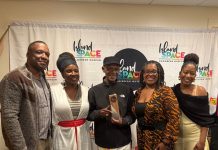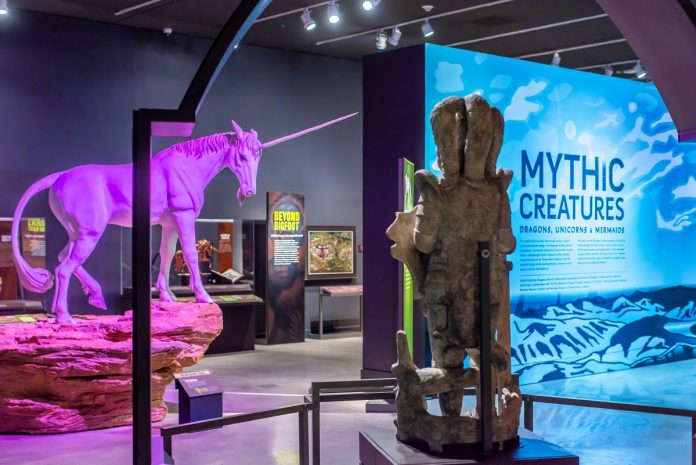
Immerse yourself in an enchanting world at HistoryMiami Museum’s new exhibition, “Mythic Creatures: Dragons, Unicorns & Mermaids.” Opened on July 8, 2023 and running until March 2024, this showcase transports you to a realm where larger-than-life creatures come alive, like dragons with wingspans stretching wider than 19 feet, mythical mermaids, and awe-inspiring unicorns.
About the Show
Presented by the American Museum of Natural History in New York, the Smithsonian affiliate exhibition takes you on a global journey, unveiling the natural and cultural origins of these legendary beings through paintings, models, textiles and interactive elements, all revealing the diverse ways in which mythical creatures have been revered across societies around the world.
But the adventure doesn’t end there — “Mythic Miami,” an accompanying South Florida-specific showcase, unveils the creatures dwelling in our own local waters, forests and skies. From Caribbean mermaids to the Bahama’s Chickcharney, Chupacabras and Florida’s mysterious Skunk Ape, these legends have fascinated generations of Miamians and are just waiting to be explored.
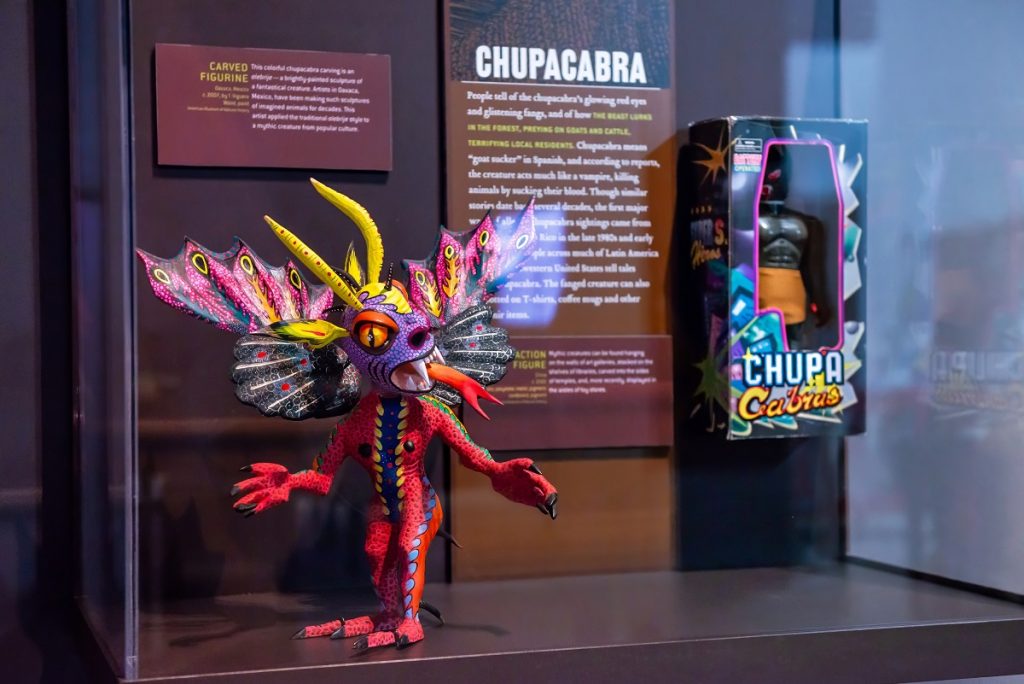
We spoke with the exhibit’s folklife curator, Vanessa Navarro Maza, about the most fascinating elements of the show, her personal connection to it, and how she was able to incorporate the uniqueness of Miami folklore into this nationally-traveled masterpiece.
What are some of the special features of this show that people can look forward to?
Maza: I love that the exhibition takes you around the world and through time through the topic of mythic creatures. You learn about all kinds of people and places in a way that’s fun and engaging. The show is beautiful too with its large scale creatures, and there are so many ways to explore your curiosity! This iteration of the exhibition features a section called Mythic Miami that focuses on mythic creatures in South Florida! We share stories and artifacts related to a selection of creatures including the chupacabra, the Skunk Ape, and mermaids in Florida and across the Caribbean.
How did your own memories of folklore influence your anticipation of this exhibit?
Maza: I grew up watching Unsolved Mysteries with my mom, so we were very excited when I was given the opportunity to take a deeper dive into topics like mermaids, chupacabras and Bigfoot. These are all creatures I’d been familiar with in one way or another, but now I have a deeper understanding of them and their cultural significance specifically in South Florida.
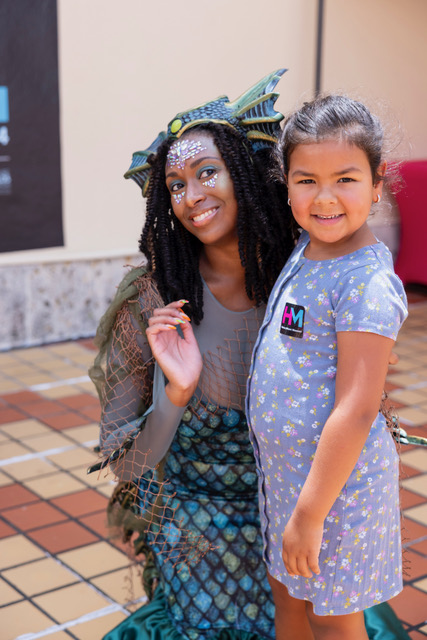
Do you have a favorite character or part of the exhibit (or multiple)? What makes it / them your favorite?
Maza: I love the mermaid section because we are able to feature different artist renditions and depictions of mermaids. I grew up with the image of Ariel from The Little Mermaid as my idea of what a mermaid looks like, and I think it’s wonderful to see this kind of creature depicted in various ways which reflect the diverse cultures in which mermaids are significant. We worked with the International Mermaid Museum in Washington to learn more about mermaid folklore from around the world.
I noticed mermaids are either believed to be benevolent spirits/creatures that can bless you or dangerous beings that can harm or even kill you. It was interesting to me that the same type of creature could be regarded in such contrasting ways depending on the culture or religion through which it’s understood.
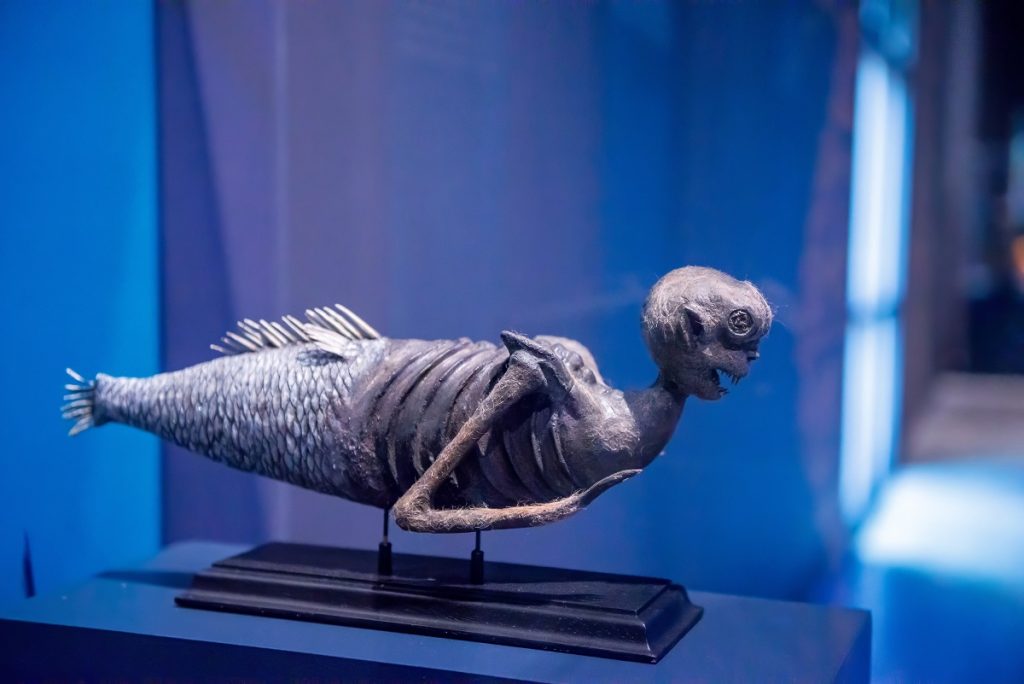
What are some of the most interesting things you’ve learned in installing this exhibit?
Maza: I was very familiar with Bigfoot, but I didn’t realize we had his cousin, the Skunk Ape, right here in South Florida! It was fascinating to learn about recorded sightings going as far back as 1818. The Skunk Ape has been an important part of our recorded Florida history for over 200 years, and likely even longer, given that Indigenous groups in the region also share stories about a tall hairy man.
Caribbean Creatures
Each country in the Caribbean has its own spate of characters and stories of the mysterious. The Bahamian chickcharney, for example, makes an appearance in the exhibit. The chickcharney inhabits the woodlands, bearing a striking resemblance to an owl with a 3-foot stature. According to popular folklore, if an adventurer encounters a chickcharney and shows kindness, they are rewarded with good luck and fortune. However, mistreating a chickcharney is believed to incur misfortune and adversity. Other representations from Caribbean life, and specifically Haitian Vodou, are also on display.
What are some of the key characters from Caribbean folklore featured in the show?
Maza: The Mythic Miami section features a section on the chupacabra, a creature that originated in Puerto Rico and made its way to Miami in the 1990s. We also feature a section on Mermaid goddesses of the Caribbean, such as La Sirene in Haitian Vodou and Yemaya in the Afro-Cuban Orisha religion.
In Jamaica, the mermaid iteration is known as River Mumma. In contrast to the peaceful tailed creatures you might be familiar with, River Mumma is said to be a siren, luring people in with a trance before taking them to their deaths. In the Dominican Republic, you may hear the story of La Ciguapa, a beautiful woman with backward facing feet who lives in the forest and preys on those who get lost in the woods.
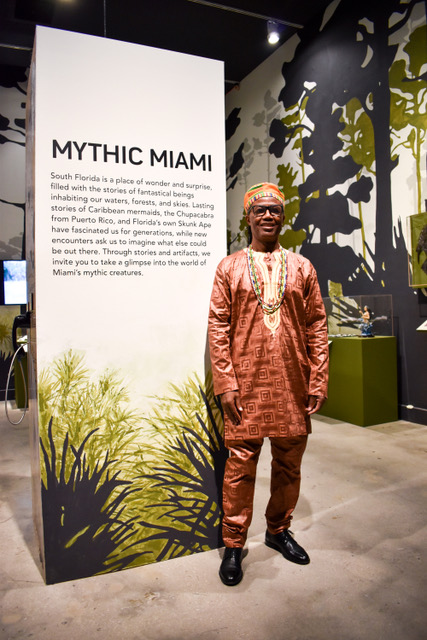
One of the participating artists is Haitian Vodou oungan (priest) Jude “Papaloko” Thegenus. As we learned about the Caribbean creatures included in the collection, Papaloko shared a bit about his artistic contributions.
Papaloko, what memories of your own home country and its characters of folklore have influenced your work in general, and specifically your work on this exhibit?
Papaloko: My participation [in this exhibit] stems from my Haitian roots where we use symbolism and imagery to represent profound spiritual concepts and values. My work is influenced by the Vodou traditions and spirituality, which is represented in this exhibit by the image of La Siren. La Siren is the goddess of the ocean, she represents the spirit of water, and is the mother and protector of life.
What is your typical style of art, and how did you use that to tell the stories that you told in this exhibit?
Papaloko: My style is surrealism that incorporates my reinterpretation of Vodou symbols and images. It is an honor to represent my roots and culture within this amazing community of world cultures and artists. I would like people to open their mind to Haitian culture and to understand the beauty and depth of Vodou spirituality.
Final Takeaways
What do you want attendees to take away from the exhibit?
Maza: I hope people come away learning a bit more about the human experience and the importance of our myths and stories in building community and connecting with one another. I hope people come out of the exhibition with a curious and open mind, wondering, “Could some of these creatures really exist?”
How can people learn more about the show, the organization and your work?
Maza: They can visit us at historymiami.org to learn more about the exhibition and all the other great work we do here at HistoryMiami Museum.





















